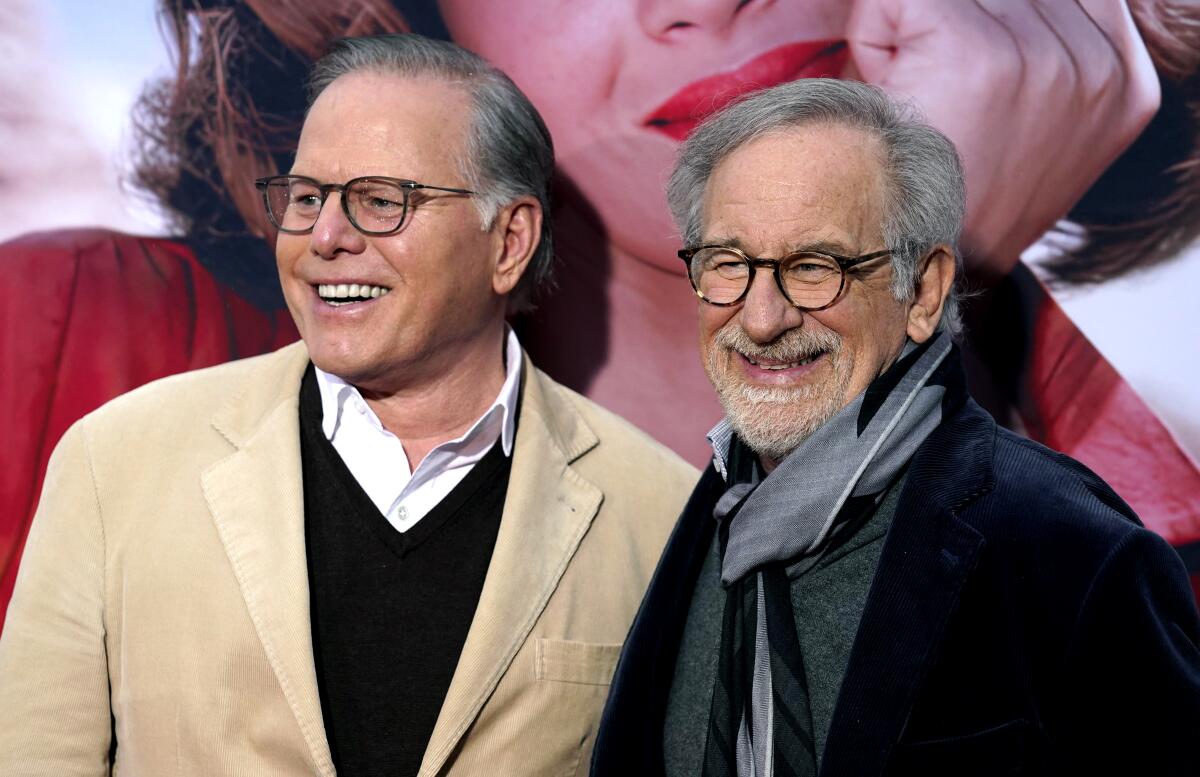Column: How profit-driven turmoil at Turner Classic Movies placed a vast cultural heritage at risk

- Share via
It wasn’t that long ago that the cause of film preservation and film history seemed to be on a roll. Multiple cable channels such as American Movie Classics, Bravo and Encore were devoted to classic films from the 1930s through the 1980s. When streaming supplanted scheduled cable programming, FilmStruck offered viewers a huge library of classics from the libraries of Warner Bros. and other studios.
Through it all Turner Classic Movies, or TCM, was the much-admired king. The channel was founded in 1994 by entrepreneur Ted Turner to show the library of MGM classic films he had acquired. It evolved to not only screen classic films but also curate its offerings, providing historical commentaries and interviews presented by knowledgeable hosts.
All those other services have either disappeared or been repurposed away from classic films. Until a couple of weeks ago, TCM appeared to be one of the sole survivors in the classic movie landscape.
Ten years ago, I felt that we were in kind of a golden age of appreciation of film classics and appreciation. ... Now it seems to be falling apart.
— Bruce Goldstein, Film Forum
But on June 20, David Zaslav, chief executive of TCM’s new owner, Warner Bros. Discovery, swung the ax. Layoffs wiped out the network’s entire top management, including some figures who had been its leaders for decades. TCM was placed under the supervision of an executive whose other responsibilities included the Adult Swim channel and Cartoon Network.
The sense of dismay and betrayal that swept across Hollywood was almost indescribable. Film stars and character actors known to millions of fans took to social media to condemn the move. Film directors Steven Spielberg, Paul Thomas Anderson and Martin Scorsese reached out to Zaslav to urge him to back off, advice he seems to have taken, partially.
The turmoil at TCM points to more than a single company’s effort to squeeze as much profit as possible from a single asset. It reflects the impulse by the corporate stewards of America’s immense film history to view that culture strictly in commercial terms.
“Whether Mr. Zaslav planned to or not, he has inherited an American cultural treasure that he is responsible for safeguarding,” film historian Alan K. Rode, a director of the Film Noir Foundation, told me. “But he’s also trying to run a business that’s over $40 billion in debt. I don’t know how you square that circle.”
Will McKinley, a New York film writer, is dying to get his hands on a copy of “Alias Nick Beal,” a 1949 film noir starring Ray Milland as a satanic gangster.
This is not a new conundrum. Almost all artifacts of film history are squirreled away in studios’ vaults, where they’ve been subject to the vicissitudes of corporate accounting and the ebb and flow of mergers and acquisitions.
Occasionally, when they’re encouraged by cultural fashions or the appearance of new technologies, the studios have burrowed into their film libraries to assess their marketability and try to untangle ownership rights.
Some 700 historic Paramount Studios productions, for example, are assumed to be nestled in the vaults of Universal Pictures, which inherited Paramount’s 1930s and 1940s film archive from its forebear MCA, which acquired the collection in 1958. (Universal was later absorbed by NBC and is now a division of the entertainment conglomerate Comcast.)
The studios don’t repurpose their libraries wholesale. Converting old films to digital formats to be screened online or on cable, or shown in theaters equipped with digital projectors, is an expensive and complicated process. Only films thought to have commercial potential get the favored treatment. Most of the others remain largely inaccessible to the public.
Warner Bros., now absorbed into Warner Bros. Discovery, was long considered the best steward of its cultural hoard. Its Warner Archives division was the industry gold standard in the care and marketing of the past. Under division head George Feltenstein, now the Warner library historian, Warner put thousands of titles, including TV series, on sale as made-to-order DVDs and established a subscription video streaming service that has since been incorporated into the company’s Max streaming service.
Choosing which films to market as DVDs or Blu-ray discs was sometimes an easy call, sometimes a challenge, Feltenstein told me in 2015. “There always will be a place on the retail shelf for ‘Casablanca,’ ‘King Kong’ or ‘Citizen Kane,’” he said. But others required finer judgments or innovative marketing. Warner Bros. still offers DVDs and Blu-rays from its classic and contemporary libraries for sale.
Classic-film cable and streaming services have tended to have short half-lives. Consider the fate of FilmStruck, which launched as the subscription-based streaming arm of Turner Classic Movies in November 2016 with an inventory of 500 films, including 200 from the classic movie library of the Criterion Collection. FilmStruck quickly became what Esquire termed “the new go-to movie destination for serious movie buffs.”
There isn’t much not to like about streaming video.
Two years later, FilmStruck was dead, slain by Warner Bros.’ new owner, AT&T, which couldn’t wait for the service to grow beyond its base of 100,000 subscribers and reach profitability. For AT&T, as I wrote then, “mass subscribership and profits are the ballgame,” patience be damned.
Other networks that had been founded to cultivate an audience of film fans suffered a similar fate. American Movie Classics was founded in 1984 as a premium cable channel to air classic films uncut and commercial-free. It even sponsored an annual film festival to raise money for film preservation. In 2002 it was rebranded as AMC and refocused on prestige TV. AMC produced “Breaking Bad” and “Mad Men,” among other series — good TV, certainly, but not classic films.
AMC’s sister channel, Bravo, was launched in 1980 to present classic foreign and independent films. After NBC bought it in 2002, it was turned into a showcase for reality series.
Yet audience interest in classic movies and film history continued to grow. “Ten years ago, I felt that we were in kind of a golden age of appreciation of film classics and appreciation, and TCM was a huge part of that,” says Bruce Goldstein, the founding repertory artistic director of Film Forum, a New York repertory house. “Now it seems to be falling apart.”
Steven Spielberg, Paul Thomas Anderson and Martin Scorsese will be involved in curating the classic film channel which will now operate under the company’s top film studio execs.
TCM and the Criterion Channel remain the go-to streaming destinations for classics. Netflix, Amazon Prime and other networks have minimal classic libraries and no learned curation.
On the surface, there is no great mystery about why Warner Bros. Discovery and Zaslav might want to draw in their financial horns a bit. The company is laboring under a crippling debt load of more than $49 billion, most of it resulting from the 2022 merger that brought together the cable programming company Discovery and the WarnerMedia division of AT&T, itself the product of AT&T’s 2016 takeover of Time Warner.
Given the combined companies’ loss of $7.4 billion on revenue of $33.8 billion last year, plainly something had to give. The question being asked by cultural historians, cinephiles and plain ordinary film fans is why TCM had to be part of the bloodletting. It was reportedly profitable, if not hugely so, but by any measure not a significant factor on the merged company’s profit-and-loss landscape.
That low profile in corporate terms could be TCM’s salvation. As my colleague Stephen Battaglio reported, an outcry in the film industry, including by Spielberg, Anderson and Scorsese, has prompted Zaslav to reassess the bludgeoning he visited upon TCM.
The network’s longtime programming chief, Charles Tabesh, who had been fired, will stay on, TCM says. Spielberg, Anderson and Scorsese will have a voice on TCM’s curation and scheduling. TCM’s classic film festival, held annually in Hollywood, will continue. In a move aimed at quelling outrage in the industry, the network will report directly to Warner Bros. Pictures Group co-heads Michael De Luca and Pamela Abdy.
Those developments generated an optimistic joint statement from Spielberg, Anderson and Scorsese: “We have already begun working on ideas with Mike and Pam, both true film enthusiasts who share a passion and reverence for classic cinema that is the hallmark of the TCM community,” the directors said.
It’s impossible to overstate the reverence that film historians and preservationists, and fans, have felt for TCM.
“They are the keepers of the flame,” says Foster Hirsch, a professor of film at Brooklyn College and member of the Film Noir Foundation board. “They’re an enormous resource for scholars and writers and fans of all ages. To start tampering with the brand or to view it in terms of marketing and data exclusively is horrifying. It’s an assault on our common culture.”
Among TCM’s virtues is its eclectic approach. “They didn’t show only well-known masterpieces,” Hirsch says. “They showed obscure films, some which aren’t good, they showed films for almost all tastes, different genres. From an artistic or historical point of view it isn’t broken. There was no reason to ‘fix’ it.”
The network has also been an almost unique portal introducing new generations to film culture. “It’s been an essential part of people’s film education, especially people of my generation,” says Jon Dieringer, 37, founder of Screen Slate, a film culture website. “I grew up watching Turner Classic Movies.”
Yet how assiduously Warner Bros. Discovery will follow through on its stated commitment to TCM’s mission remains open to question, as does whether the network can retain its stature in the cinephile community. The confidence that the network’s fans had in its staff and hosts and their ability to provide a curated approach to film history has been deeply shaken.
Many in the film community are hoping that TCM may have suffered nothing more serious than a near-death experience. Whether that’s so won’t be known for some time. Everyone will be watching, but experience suggests that when public companies pledge to treat the cultural assets under their control as more than generators of cash and profits, it’s wise to expect the worst.
More to Read
Get the latest from Michael Hiltzik
Commentary on economics and more from a Pulitzer Prize winner.
You may occasionally receive promotional content from the Los Angeles Times.












